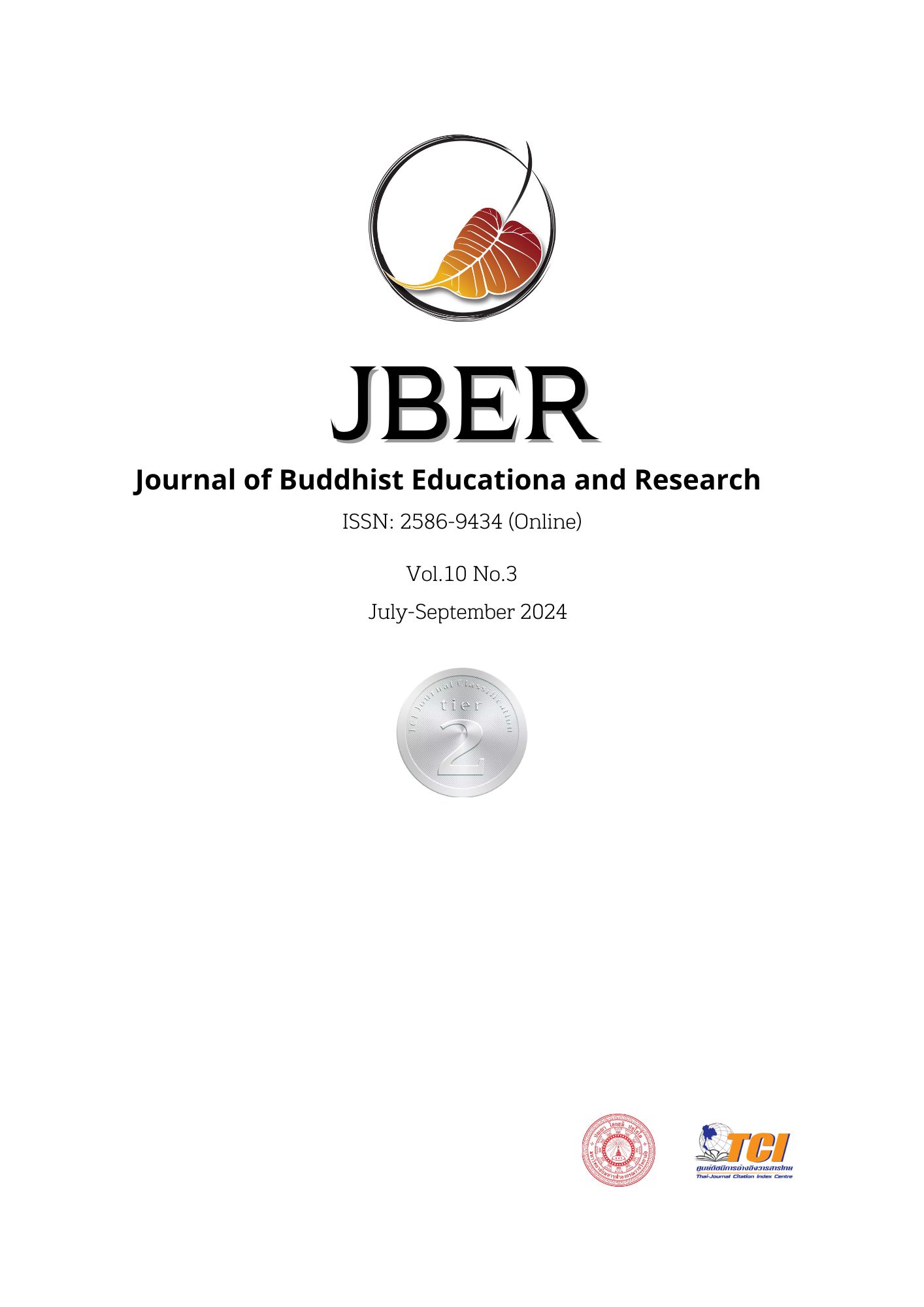Learning Management by TAI (Team Assisted Individualization) for Improving Students’ Achievement on the Topic ‘Life Based on the Four Iddhipāda Dhammas’ of Grade3 Lower Secondary School Students in Huakhiew Wittayalai School, Khon Kaen Province
Keywords:
TAI learning activity, academic achievement, 4 Iddhipāda principles, social studies, religion and culture education, junior high school studentsAbstract
The objectives of this research were: 1) to study teaching and learning conditions; 2) to compare learning achievements; 3) to propose the learning management guideline using TAI (Team Assisted Individualization) learning activities to develop learning achievements in social studies, religion, and culture on the topic ‘Principles of Life’ according to the Four Iddhipāda Dhammas of the 3rd year secondary school students of Huakhiew Wittayalai School, Khon Kaen Province. This study was carried out through quantitative and qualitative research. The target group included 21 of 3/1 secondary school students. The tools used in this study were a learning management plan, a learning achievement test, and a satisfaction assessment form. The statistics used in the research were: Frequency, Percentage, Mean and Standard Deviation. The research results were as follows: 1) The use of TAI learning activities was statistically rated at an 'excellent' level. Based on the criterion consideration, the conditions of the learning management were constantly better. 2) The comparison of grades before and after learning of the students in of Huakhiew Wittayalai School, Khon Kaen Province showed the efficiency (E1) at 80.25% and outcome efficiency (E2) at 84.75 %, higher than the set criterion of 80/80. 3) The learning management guideline using TAI learning activities to develop learning achievements in social studies, religion, and culture on the topic ‘Principles of Life’ according to the Four Iddhipāda Dhammas of the 3rd year secondary school students of Huakhiew Wittayalai School, Khon Kaen Province was that students have better grades and were more active in their studies. Teachers had new learning activities, namely TAI learning activities, and the principle used in teaching which was the Four Iddhipāda Dhammas: Chanda means satisfaction, creating value to the students and satisfaction in teaching and learning: Viriya is striving to seek knowledge; Citta is to create awareness and to pay attention to the importance of learning and helping others; Vīmaṁsā is to reflect and review the learning content continually
References
Kakkeaw, N. (2024). Emerging Trends in Educational Management: Transforming Education in Northeast Thailand. Insights into Modern Education (i-ME), 1(1), 17–25. Retrieved from https://so19.tci-thaijo.org/index.php/IME/article/view/599
Nasawaeng, B. (2024). Integrating Buddhist Teachings into Social Studies: A Transformative Approach to Education in Thailand. Insights into Modern Education (i-ME), 1(1), 26–35. Retrieved from https://so19.tci-thaijo.org/index.php/IME/article/view/600
Niltakan, K., & Sukumal, P. (2024). Integrating Buddhist Teachings with Health Education: The Development and Impact of the Buddhist Instruction Model for Diabetes Risk Prevention in Khon Kaen Province, Thailand. Insights into Modern Education (i-ME), 1(1), 1–16. Retrieved from https://so19.tci-thaijo.org/index.php/IME/article/view/598
Ruangsan, N. (2017). Mahachula-Academics: Proactive Propagation of Buddhism at Khon Kaen Campus. Online Submission, 3(2), 89–97.
Saikham, S. (2024). Navigating Complexities: Challenges in Educational Institution Administration in Northeast Thailand. Insights into Modern Education (i-ME), 1(1), 36–44. Retrieved from https://so19.tci-thaijo.org/index.php/IME/article/view/601
Thairoongrojana, S. (2024). Leveraging Cutting-Edge Information Technology to Enhance Student Learning. Insights into Modern Education (i-ME), 1(1), 45–54. Retrieved from https://so19.tci-thaijo.org/index.php/IME/article/view/623
กรมวิชาการ กระทรวงศึกษาธิการ. (2543). การสร้างองค์ความรู้ด้วยตนเอง. กรุงเทพมหานคร: โรงพิมพ์ศาสนา.
กระทรวงศึกษาธิการ. (2551). หลักสูตรแกนกลางการศึกษาขั้นพื้นฐาน. กรุงเทพมหานคร: โรงพิมพ์ชุมนุมสหกรณ์การเกษตรแห่งประเทศไทย จำกัด.
กระทรวงศึกษาธิการ. (2552). หลักสูตรแกนกลางการศึกษาขั้นพื้นฐาน พุทธศักราช 2551. กรุงเทพมหานคร: โรงพิมพ์ชุมนุมสหกรณ์การเกษตรแห่งประเทศไทย จำกัด.
ขวัญตา บัวแดง. (2553). การศึกษาผลการเรียนรู้เรื่องวิกฤตการณ์สิ่งแวดล้อมทางธรรมชาติของนักเรียนชั้นมัธยมศึกษาปีที่ 5 ที่จัดการเรียนรู้โดยใช้ปัญหาเป็นฐาน (วิทยานิพนธ์ปริญญาศึกษาศาสตรมหาบัณฑิต). มหาวิทยาลัยศิลปากร, กรุงเทพฯ.
ฉันทนา เวชโอสถศักดา. (2537). ปัญหาการใช้แหล่งสารนิเทศและความสามารถการค้นหาสารนิเทศของนักศึกษาแพทย์หลักสูตรแบบดั้งเดิมและหลักสูตรแบบใช้ปัญหาเป็นหลัก (วิทยานิพนธ์ปริญญามหาบัณฑิต). มหาวิทยาลัยศรีนครินทรวิโรฒ, กรุงเทพฯ.
ณรงค์ฤทธิ์ สังฆะศรี. (2547). การศึกษาผลสัมฤทธิ์ทางการเรียนกลุ่มสาระสังคมศึกษา ศาสนาและวัฒนธรรมและความสามารถในการคิดอย่างมีวิจารณญาณของนักเรียนชั้นมัธยมศึกษาปีที่ 1 ที่โรงเรียนโดยการสอนแบบสืบเสาะหาความรู้กับการสอนแบบบูรณาการ (วิทยานิพนธ์ปริญญามหาบัณฑิต). มหาวิทยาลัยศรีนครินทรวิโรฒ, กรุงเทพฯ.
ทรงลักษณ์ ชาวผ้าขาว. (2543). ผลการสอนแบบแก้ปัญหาต่อความตระหนักทางด้านปัญหาสิ่งแวดล้อมของนักเรียนชั้นมัธยมศึกษาปีที่ 3 ในรายวิชาประชากรกับสิ่งแวดล้อม (ส 053) (วิทยานิพนธ์ศึกษาศาสตรมหาบัณฑิต). มหาวิทยาลัยเชียงใหม่, เชียงใหม่.
ทองสุข คำธนะ. (2538). ผลการเรียนการสอนแบบใช้ปัญหาเป็นหลักที่มีต่อความสารถในการแก้ปัญหาทางการพยาบาลผู้สูงอายุของนักเรียนพยาบาล (วิทยานิพนธ์ปริญญาพยาบาลศาสตรมหาบัณฑิต). จุฬาลงกรณราชวิทยาลัย, กรุงเทพฯ.
ทิศนา แขมมณี. (2547). ศาสตร์การสอน: องค์ความรู้เพื่อการจัดกระบวนการเรียนรู้ที่มีประสิทธิภาพ. กรุงเทพมหานคร: สำนักพิมพ์แห่งจุฬาลงกรณมหาวิทยาลัย.
เบญจวรรณ อ่วมมณี. (2549). การพัฒนาผลการเรียนรู้และความสามารถในการคิดแก้ปัญหา เรื่องการอนุรักษ์แม่น้ำท่าจีน ของนักเรียนชั้นประถมศึกษาปีที่ 5 ที่จัดการเรียนรู้โดยใช้ปัญหาเป็นฐาน (วิทยานิพนธ์ปริญญาศึกษาศาสตรมหาบัณฑิต). มหาวิทยาลัยศิลปากร, กรุงเทพฯ.
พจนารถ บัวเขียว. (2535). การศึกษาผลสัมฤทธิ์ทางการเรียนและความสามารถในการวิเคราะห์ตนเองของนักเรียนชั้นมัธยมศึกษาปีที่ 2 ที่สอนโดยการสอนแบบแก้ปัญหาที่ใช้วิธีคิดแบบโยนิโสมนสิการกับการสอนตามคู่มือการสอนของหน่วยศึกษานิเทศก์ (ปริญญานิพนธ์การศึกษาหาบัณฑิต). มหาวิทยาลัยศรีนครินทรวิโรฒ, กรุงเทพฯ.
เฟื่องฟ้า ภูมิมาลา. (2540). กระบวนการแก้ปัญหาและผลสัมฤทธิ์ทางการเรียนวิชากฎหมายน่ารู้ของนักเรียนชั้นมัธยมศึกษาปีที่ 3 โดยวิธีการสอนแบบแก้ปัญหา (วิทยานิพนธ์ศึกษาศาสตรมหาบัณฑิต). มหาวิทยาลัยเชียงใหม่, เชียงใหม่.
มณฑนา บรรพสุทธิ์. (2553). การพัฒนาความสามารถในการคิดแก้ปัญหาทักษะชีวิตของนักเรียนชั้นมัธยมศึกษาปีที่ 2 ด้วยการจัดการเรียนรู้แบบปัญหาเป็นฐาน (วิทยานิพนธ์ปริญญาศึกษาศาสตรมหาบัณฑิต). มหาวิทยาลัยศิลปากร, กรุงเทพฯ.
มัณฑรา ธรรมบุศย์. (2544). การพัฒนาคุณภาพการเรียนรู้ โดยใช้ PBL (Problem Based Learning). วารสารวิชาการ, 2544.
วัชรา เล่าเรียนดี. (2549). เทคนิควิธีการจัดการเรียนรู้สำหรับมืออาชีพ. นครปฐม: มหาวิทยาลัยศิลปากร.
Downloads
Published
How to Cite
Issue
Section
License
Copyright (c) 2024 Author(s)

This work is licensed under a Creative Commons Attribution-NonCommercial-NoDerivatives 4.0 International License.





